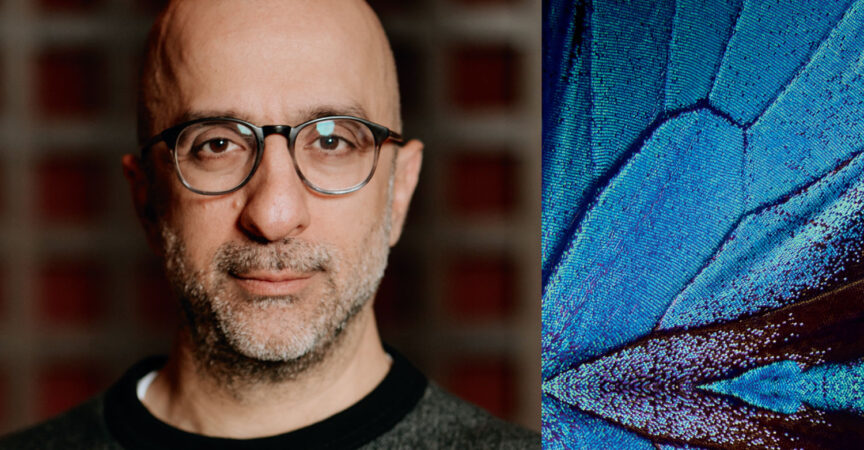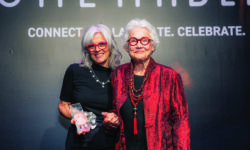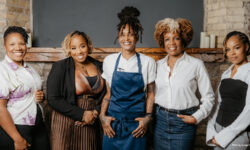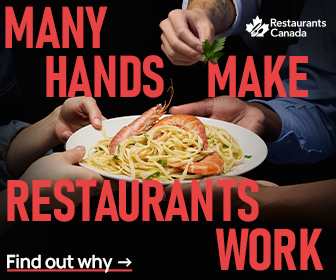La Farfalla
Chef John Sinopoli shares the mechanics behind Ascari Hospitality Group’s stunning metamorphosis.
Led by owner and executive chef John Sinopoli, president Erik Joyal, and partner and chief operating officer Rahil Hoque, Toronto’s Ascari Hospitality Group has transformed from a celebrated single-unit independent to a multi-line restaurant, catering and events, and retail business without compromising the original founders’ vision, product or momentum. Not even for a global pandemic. Chef John Sinopoli shares the Ascari story with hope that other operators can learn and grow from their experience.
We caught up with the always busy and always inspirational Chef John Sinopoli (on a drive home from a late meeting) to talk about Ascari Hospitality Group’s intentional and successful evolution and growth, which continued unabated throughout the pandemic. Generously willing to share knowledge and experience with others in the industry, John did not disappoint, and let us into his cocoon.
Sharing is what Sinopoli does best, and he’s built a growing culinary empire on inviting people into his “house” for world-class, quality cooking without smoke and mirrors. “Our technique is sound, precise and respectful of the ingredients. It’s honest, high-quality, professionally-cooked food, but there has to be an element of surprise,” he shares. “A lot of the items on our menu are inspired by our family’s table at home.”
Growing up as the kid of Italian immigrants, on Sundays Sinopoli’s family would share polenta with sugo served on a wooden board. “So you make this sauce that’s super rich and tender with all these offcuts in it and you bring out a three by four-foot wooden board with the polenta and you just pour the sauce over it. Everyone just takes their fork and eats it off the board. It was this incredible, fun, communal experience when you were a kid. Your cousins are over, your friends and family are over—it’s a great way to feed a lot of people without dirtying a bunch of plates. When we brought that into the restaurant, people just loved the shared experience. These are the food memories that matter to us. The food has to be delicious, the mechanics have to be correct, but what keeps people coming back is the emotional connection. You want your staff and guests to be emotionally connected to what you do. Then, you need to let your people spread their wings and fly—create their own stories, their own regulars, and their own emotions on the plate.”
Deeply committed to this principle, Sinopoli tells the story of his journey from chef-owner of a single-unit independent chef to multi-unit operator, slow-cooked for the times we’re in, and ready to share with the restaurant community.
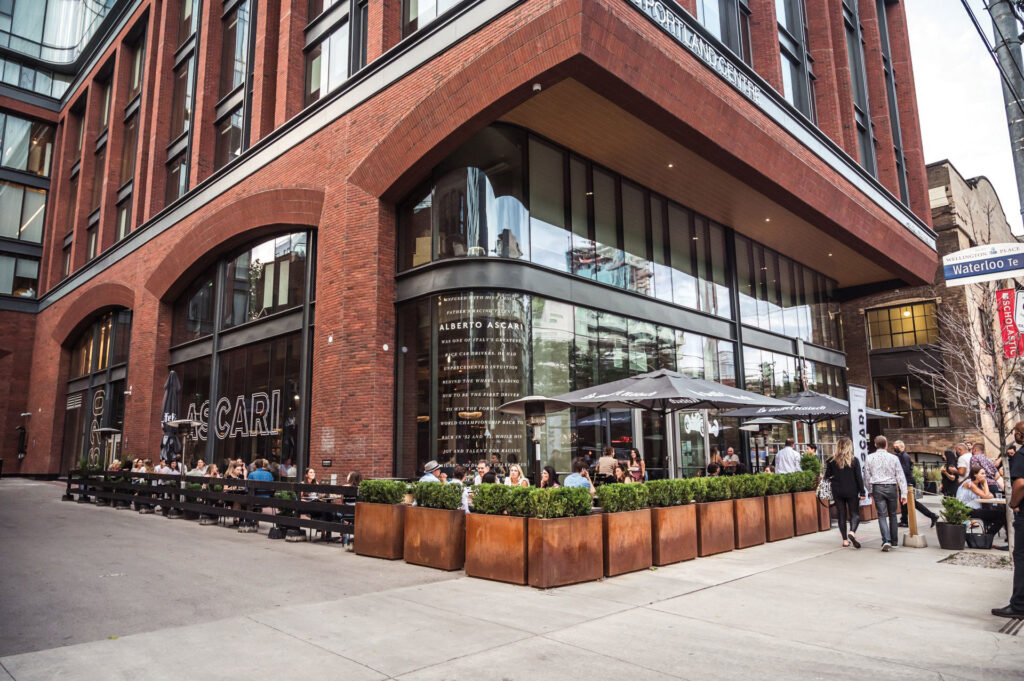
On getting smarter to grow bigger…
“I think we’re unique in the way we’re transitioning from being a small operator with one or two restaurants to something hopefully a little bigger—a medium-sized company without a ton of external funding. We’re just trying to bootstrap it and grow organically. We want to pace-set and show other smaller operators that they can do it. They can make that move. It’s possible to get out from behind the counter or behind the stove and create the systems and protocols they need to replicate to get there.”
Growth like this did not always seem like an achievable path for Ascari—the decision to transform and scale the business was one John grappled with. “For years, I was behind the stove and in the kitchen with my team and Eric was front-of-house running the business side and reservations and the team up front. We asked ourselves how anyone could do more than one restaurant and keep up the quality control. We felt we had to be there every day and even our two days off a week could be challenging—we were always getting phone calls.”
The mechanics of our decision to try and grow really came down to two things: team and training.
On hiring forward…
“The strategy for us is to hire people who are probably more qualified than the position we need them in in the moment, to think forward to where we need them to be a year from now, and then create a structure for those employees. If you know you need to fill a certain position in six months, what is the employee’s path to learning about the place, who we are, and the culture of the space? We put them on a path and training system that facilitates that move up and gives them the confidence to own the new role. Whether you’re hiring a sous chef or a floor manager who you want to be the GM, you hire someone with those future-state qualities who just hasn’t taken that next step yet and then set them up for success.”
For the Ascari team, Sinopoli notes that failure is purpose-built into their employee development model. “In time, we slowly take our hands off the steering wheel and allow them a little rope to fail. One of the strategies we learned to be very effective was to not be so uptight about people making mistakes. What we remained uptight about was how they stood up again or how they got up and recovered. That was much more important to us. Did they make a mistake, tell us, and then own the solution? Or, did they make a mistake and leave it to us to figure out the solution? We promote people who create the solutions for us to approve, disapprove or contribute to. That’s how our growth happened. We were able to open a second place by leaving the first place in the hands of capable team members and move on to the opening, which requires singular attention. Now, we have three restaurants, a retail wine shop, wine bar and prepared food store as well as a full-fledged event and catering company with a commissary kitchen. It’s possible, and it’s a lot of hard work that takes a lot of faith in staff.”
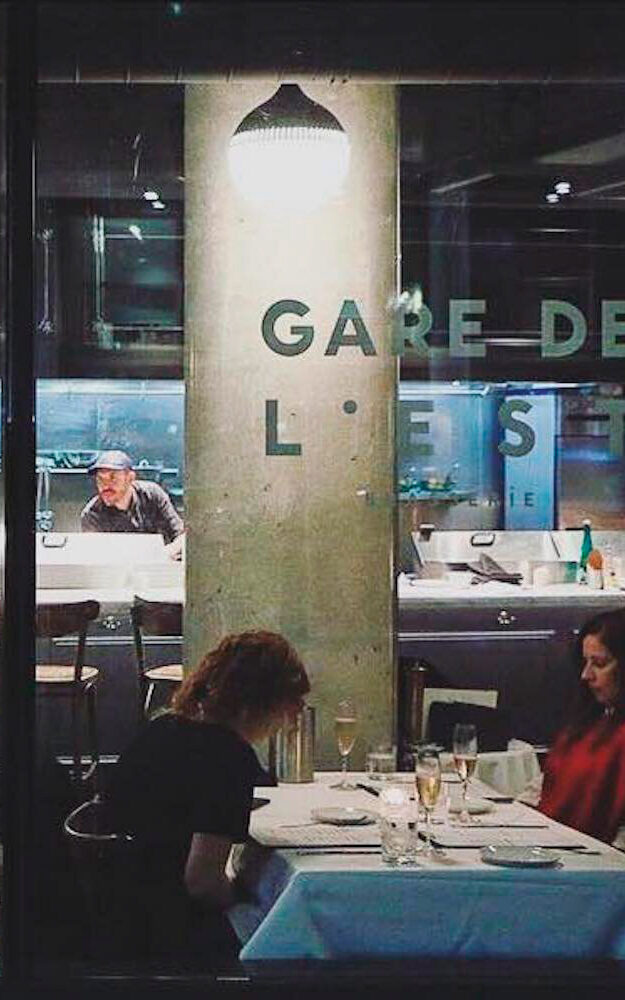
It’s not one-size-fits-all in the Ascari universe. Ultimately, it’s about listening, observing and adapting to give and receive the employer-employee relationship. “There are times when it’s beneficial to be fully transparent with an employee and share your vision for their path. There are other times where you might just wait and see what people do with the opportunities they’re given—let them spread their wings and show you their initiative. There are times when you’re surprised; you don’t think people have a certain potential and then, within weeks, you realize they’re going above and beyond, picking things up very quickly, they intuitively understand the correct way to approach customers or speak to their fellow staff members, organize their tasks and their day. There are people who just show up on time every day ready to learn and grow and work hard. Then, there are people who come and for some reason just want to be passengers. Every team may have a few passengers, but it’s the first group you watching and waiting to groom, train and pour your energy, money and time into. They’re the ones asking questions and requesting new opportunities to learn.”
On building up confidence and showing respect…
“Sometimes, you do have to nudge a little and work with people to instill confidence in someone who may be a little timid,” Sinopoli speaks from experience. “Maybe no one has told them they’re good at what they do? I worked as a cook in a very busy, very high expectation restaurant in New York City. I had been there for maybe six or eight months and had been moved to a new station that was incredibly challenging. Each day at five o’clock I was almost never ready, never set up and I wondered, “Is this just impossible or am I just not good enough to do this?” The chef, my boss, noticed I was down and asked what was wrong. I said, “I’m just never ready. I can’t get it down.” He looked at me and asked, “You do know that you’re very good at what you do, right?” I did not know that. “Everything you put up is seasoned, and cooked correctly,” he said. My confidence just clicked, and when your confidence goes up and your anxiety level goes down, your work production improves. Sometimes that’s all you need is someone to lean over and finally tell you you’re good at your job.”
The expectations of hospitality employees have changed, and probably for the better. People don’t have to be worked into the ground to be considered fully dedicated and successful.
On attitude over aptitude…
Consideration and respect only matter more as restaurants struggle to attract and retain great people. “I think it’s important to note that the pandemic has changed the game in terms of hiring, quality of team members, training structure and work-life balance. The expectations of hospitality employees have changed, and probably for the better. People don’t have to be worked into the ground to be considered fully dedicated and successful.”
Sinopoli doesn’t focus on hiring solely based on where someone studied. “We’ve always hired based on resume. In the times we’re in, we’re hiring much more on attitude versus aptitude. We don’t look down on any resume until we meet someone and really try to understand them. Recently, I’ve had some very talented cooks come to me through a history of chain restaurants. Normally, that’s not where independents seek kitchen talent, but man—in a short-staffed world, people who understand systems and standard operating practice are very valuable. I can teach you how we cook, but what I love is the organized, task-mastering approach. We’ve changed how we look at resumes and who we take interviews with and who we love to hire. And then next, it’s a question of personality—is this person a culture fit? —both within their team and the company. We’ve learned that the first two weeks of an employee’s tenure is very indicative of their future within the company, and the responsibility of nailing those first two weeks is almost entirely on the company; not the employee. If we’ve done a good job of creating a comfortable, welcoming, structured environment, someone is going to feel comfortable and invested in the company and will be more forgiving of any small mistakes we might make. People need to build trust to forgive mistakes. For us, the first couple of weeks of training, orientation, corporate awareness and personal introductions makes people feel like they’re part of the team in a meaningful way. We’re not perfect either, but we’re working on that because it matters, and expect the same from our staff in return.”
On the importance of sharing resto-culture.
Sinopoli is a huge proponent of culture-building in the workplace. “Every strong company or operation needs to build a culture that is consistent and tangible. For us—and we discuss this all the time—our culture is about high-quality people who understand warm, friendly, approachable hospitality. We’re thoughtful and precise and make a strong attempt at avoiding all forms of pretension or losing touch with any customer who walks through the door. It means the hospitality must be honest and genuine so that everyone from the front to the back understands that we cook for customers. We don’t cook for ourselves. I oversee the back-of-house team, and that’s the one thing my corporate executive chef Luke Donato and I try to drive home. When the team develops specials, when they think about how to respond to customer requests, we try and accommodate. We’re there to cook for our guests. That said, we’re not a “say-yes-to-anything” culture. We are a customer-centric culinary operation. That doesn’t mean “fries with everything”. It means we stay true to the concept we’ve created and the expectations and boundaries we’ve worked so hard to set.”
There’s a reason people regularly patronize the better chain restaurants as frequently as they do. It’s because they get the kind of service they want. They get “warm and friendly” and they like it. They don’t want to be plate-shamed. That’s why when you’re in our house, we’re going to take care of you.
This give and take is built into the Ascari business. Keeping the food and service honest and unpretentious while providing a true culinary experience is a nuanced balancing act. “We’re not here to teach our customers”, explains Sinopoli. “We’re here to share and listen. We bring in the best possible quality product and are always searching for new suppliers and interesting things to put on the plate or in the glass. We connect with our suppliers so we can tell the story of their food at the table and share the “hows” and the “whys.” That’s the cultural through-line for everything we do, whether it’s a coffee shop, a wine bar, a French brasserie or one of our Italian restaurants. I spent the better part of the last 25 years immersing myself in food, cooking, and wine and how to prepare things for people in a way that is impressive, but not intimidating. It may sound clichéd to say “warm, familial hospitality,” but there’s a reason people regularly patronize the better chain restaurants as frequently as they do. It’s because they get the kind of service they want. They get “warm and friendly” and they like it. They don’t want to be plate-shamed. That’s why when you’re in our house, we’re going to take care of you.”
Chef John Sinopoli, Owner and Executive Chef of Ascari Hospitality Group is Restaurants Canada’s 2022 Leadership Award winner. John’s love for the hospitality industry has been demonstrated in many ways over the years. As one of the founders of savehospitality.ca, in the early days of the pandemic, John helped launch a campaign to support the restaurant industry. The LocalLicious event followed, with restaurants offering prix fixe menus to help and highlight local restaurants.
John graduated from the French Culinary Institute and subsequently honed his skills at celebrated restaurants La Caravelle and Kraft in New York. Returning to Toronto in 2003, he cooked at Splendido until partnering with Erik Joyal in 2005. Today, Ascari Hospitality Group owns and operates Italian cuisine notables Ascari on King Street and Ascari Enoteca as well as the French brasserie-styled Gare de l’Est. They also offer in-person and online retail at Mercatino e Vini, including meal kits and prepared foods as well as curated wines and grocery items.



